History of the business
Plant
Engineering
The plant engineering business started with boilers for marine machinery, and we are currently expanding into various businesses, such as industrial plants; industrial machinery; environmental business facilities, such as municipal waste incineration facilities; and the manufacture of LNG and hydrogen tanks utilizing cryogenic technology.
-
1880/ Meiji 13
Construction begins on marine machinery, starting with boilers
Our history with boilers started with marine boilers (for merchant ships and warships). The first commemorable boiler was the Scotch boiler.
-
1917/ Taisho 6
Construction starts on the Takuma water pipe boiler at Kisha Seizo Co., Ltd.
After the modern boiler was completed, the technology used in the Takuma boiler later led the domestically-produced boiler industry.
Kisha Seizo was merged with Kawasaki Heavy Industries in 1972.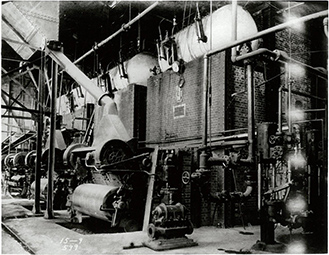
L400 Takuma water pipe boiler for Asahi Fabric Zeze Plant
-
1931/ Showa 6
Construction of sixty-two 12,000-ton heavy oil tanks for the Kure Naval Department
-
1932/ Showa 7
Start of industrial machinery plant business
Our plant business began while we were focusing on the shipbuilding department, around the time we started construction on cement kilns and other equipment.
Until the end of the second world war, we manufactured various kinds of industrial equipment, starting with the rotary kiln in 1932.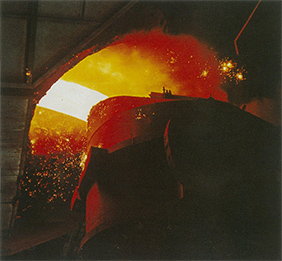
Revolving furnace plant for Nippon Steel Nagoya Works
-
1937/ Showa 12
Entering a technical collaboration with the German company La Mont for the La Mont forced circulation boiler
This positioned our company as a leading manufacturer of forced circulation boilers in Japan.
-
1957/ Showa 32
Order received from Yawata Chemical Industry for construction and installation of complete clinker grinding facilities at its Hiagari Cement Plant for blast furnace cement
(The raw material mill was a 1,700 HP center-drive, Unidan wet raw material mill, the largest after the war)
-
1957/ Showa 32
Manufacturing shield tunneling machine
We constructed the first Japanese-made roof shield tunneling machine of the world’s largest class for Teito Rapid Transit Authority.
-
1958/ Showa 33
Using steam turbines made by our company on Japan Defense Agency patrol vessel
We constructed the Uranami, a kou-class patrol vessel.
The Kawasaki NS175 steam turbine was used as the main engine.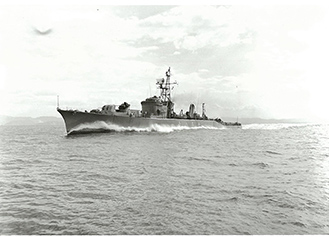
Kou-class patrol vessel, Uranami
-
1959/ Showa 34
Manufacturing spherical tanks
We received an order from Showa Yokkaichi Sekiyu for Japan’s first spherical LPG tanks using HT60 steel. After that, demand for spherical tanks increased sharply with the development of the petrochemical industry, so we pioneered the construction of large LPG tanks in the industry.
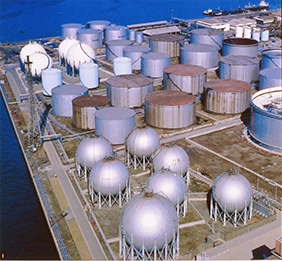
Asia Oil Yokohama Refinery spherical tanks
-
1961/ Showa 36
Exporting cement plants as an opportunity to expand overseas
Starting with receiving an order for a plant from Taiwan’s Universal Cement Corporation, we went on to build a track record, mainly in South Korea and Southeast Asia, solidifying our position as a cement plant manufacturer.
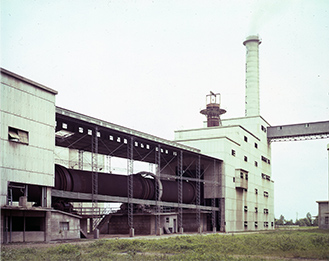
Universal Cement Corporation Cement plant
-
1961/ Showa 36
Delivery of Japan’s largest spherical LPG tank (Volume: 2,000 cm3, Diameter: 15.8 m) for Nippon Petroleum Gas
-
1962/ Showa 37
Completion of prototype for Kawasaki BS type package boiler
It had a unique waste heat recovery method and gained a lot of users due to its excellent economic efficiency and high performance.
-
1962/ Showa 37
Completion of industrial machinery factory at Kobe Works
The aim was to expand the scale and diversify the types of production, such as cement manufacturing plants, iron manufacturing machinery, sugar manufacturing plants, and brewing plants.
-
1964/ Showa 39
Construction starts on municipal waste incineration plants
We delivered the first practical municipal waste incineration facility unit.
After that, Yokoyama Kogyo and Kisha Seizo, which our company later merged with, each delivered their first units as well.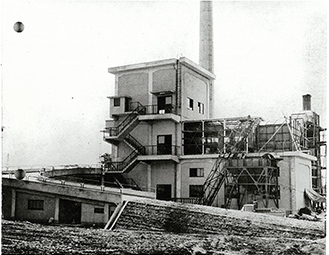
Waste incineration plant for Ichinomiya City, Aichi Prefecture
-
1965/ Showa 40
Completion of Japan’s first large-diameter mechanical shield tunneling machine (jointly designed with Kumagai Gumi)
-
1966/ Showa 41
Merger with Yokoyama Kogyo Co., Ltd.
We merged with Yokoyama Kogyo Co., Ltd., which manufactured products such as boilers, grinders, and transportation machinery.
-
1968/ Showa 43
Delivery of environmentally-friendly waste incineration plant to Kobe City
We delivered a large waste incineration plant in Karumojima, Kobe City.
The plant was constructed in an urban area, so smokeless and odorless operation was implemented.
The generated heat was turned into steam, which was used in heated swimming pools. It was the first time that heat had provided for a heated swimming pool in Japan.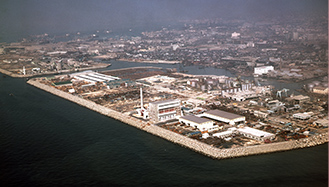
Waste incineration plant in Karumojima, Kobe City
-
1971/ Showa 46
Opening of Harima Works
The Harima Works was established as a coastal factory to handle the increasing size of industrial machinery, expanding project scales, and the growth in plant exports.
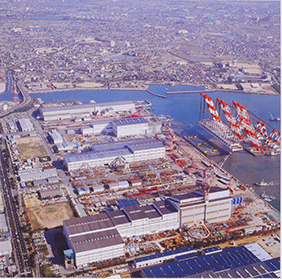
Harima Works
-
1978/ Showa 53
Expansion overseas, and receiving continuous orders for large plants
Japan was experiencing what was known as the largest postwar recession at the time, private sector capital investment had stagnated, and there was a slump in domestic demand. To break out of this stagnation, we expanded overseas and focused all our efforts on securing various plant orders.
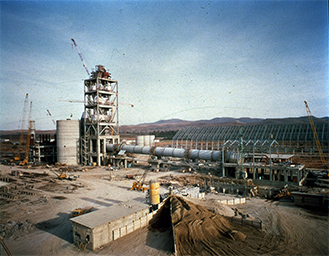
Cement plant for Algeria
-
1980/ Showa 55
Delivery of large waste incineration plant to Kyoto City
The waste incineration plant at a waste treatment facility in eastern Kyoto utilized waste heat to generate electricity, which was supplied to various parts in the facility. The plant also played a significant role in effective utilization of energy through initiatives such as providing steam to the adjoining sewage treatment plant and heat to a heated swimming pool.
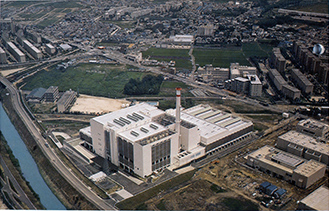
Waste treatment facility in eastern Kyoto
-
1984/ Showa 59
Engagement in the H-1 domestic rocket project
The launch site facilities at the time included Japan’s first large liquid hydrogen tank, and was our first large-scale integrated project, which also included pipe installation.
-
1987/ Showa 62
Order received from Transmansche Construction for two tunnel boring machines for the Channel Tunnel underwater railroad
-
1991/ Heisei 3
Success with tunnel boring machines in the excavation of the English Channel underwater railroad tunnel
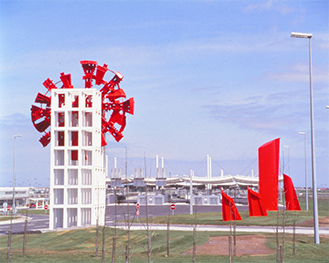
Dover Monument
-
1992/ Heisei 4
Order received from Tokyo Gas for the world's first fully buried LNG tank with the world’s largest storage capacity (200,000 kl)
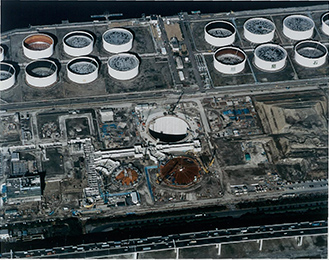
Tokyo Gas Ohgishima factory tanks
-
1996/ Heisei 8
Completion of excavation of Tokyo Bay Aqua-line by world’s largest shield machines
-
2005/ Heisei 17
Plant Division spun off and established as Kawasaki Plant Systems, Ltd.
-
2006/ Heisei 18
Environment Division spun off and established as Kawasaki Environmental Engineering, Ltd.
-
2007/ Heisei 19
Kawasaki Plant Systems, Ltd. and Kawasaki Environmental Engineering, Ltd. merge and launch anew as Kawasaki Plant Systems, Ltd.
-
2010/ Heisei 22
Remerging of Kawasaki Shipbuilding Corporation, Kawasaki Precision Machinery, and Kawasaki Plant Systems
-
2011/ Heisei 23
Completion of urea production facility for Fatima Fertilizer Company’s fertilizer plant in Pakistan
Agriculture is a key domestic industry in Pakistan, and there is a strong demand for fertilizer in order to maintain and develop the industry. The facility uses natural gas to produce urea and various other synthetic fertilizers from ammonia. It can produce 1,500 tons of urea per day, and is one of the largest facilities in the country.
-
2012/ Heisei 24
Completed delivery of three shield tunneling machines for Abu Dhabi sewerage drain construction work
-
2014/ Heisei 26
Delivery of waste treatment and biogas generation complex to Hofu City
It was constructed as Japan’s first waste treatment and biogas generation complex and conducts highly-efficient waste power generation. It has a maximum power generation capacity of 3,600 kW, with a power generation efficiency of 23.5% (when processing standard waste) for superior environmental and energy-saving performance.
-
2015/ Heisei 27
Delivery of the fourth series of ferronickel smelting plant facilities to Indonesia’s PT Antam Tbk
-
2016/ Heisei 28
Delivery of waste treatment facility for Watari Natori Joint Sanitary Disposal Association (Iwanuma Tobu Environment Center, 78.5 tons/day x2 units)
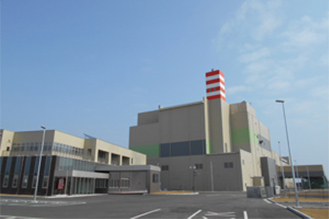
Waste treatment facility for Watari Natori Joint Sanitary Disposal Association
-
2017/ Heisei 29
Delivery of waste treatment facility for Kobe City (Minatojima Clean Center, 200 tons/day x3 units)
The facility is one of the leading facilities in Japan for recovering energy from waste treatment.
It is also the first large-scale incinerator since moving to a stepped furnace design. One of the exterior walls of the building was made of glass to increase visibility and integrate the waste treatment facility with the area. Since the construction site was reclaimed land on Port Island, the floating construction method was used to achieve a shorter construction period.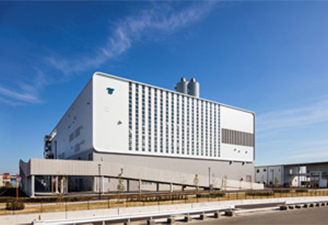
Waste treatment facility for Kobe City
(Minatojima Clean Center, 200 tons/day x3 units) -
2018/ Heisei 30
Delivery of newly-developed U-KACC boiler and turbine generator facilities to Fuji Oil Company, Ltd.’s Sodegaura Refinery
The U-KACC boiler uses a low-NOx, low-soot combustion system. Since a hopper is installed at the bottom of the furnace, continuous ash removal is possible, and the structure is able to handle fuel containing ash. Attached as auxiliary equipment are high-performance flue gas treatment systems (NOx removal system, dry type electrostatic precipitator, desulfurization system, and wet type electrostatic precipitator), giving it environmentally-friendly specifications.
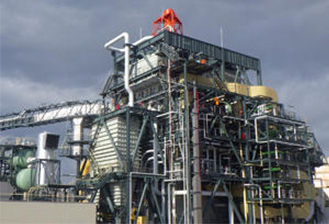
Petroleum Residue Fired Boiler KACC®/U-KACC® boiler
-
2019/ Heisei 31
Delivery of waste treatment facility for Takatsuki City, Osaka Prefecture (Takatsuki Clean Center Plant No. 3, 150 tons/day x1 units)
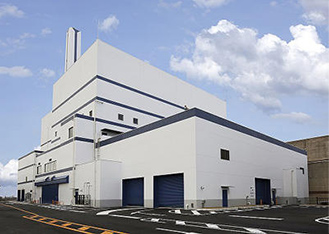
Waste treatment facility for Takatsuki City, Osaka Prefecture
(Takatsuki Clean Center Plant No. 3, 150 tons/day x1 units) -
2019/ Heisei 31
Delivery of world’s largest gas-to-gasoline (GTG) manufacturing facilities for Turkmenistan’s state-owned company, Turkmengas
The plant is based on an advanced technology developed by Topsoe, a Danish company providing the world with chemical process technologies and catalysts, and can produce 600,000 tons of high-quality gasoline annually using natural gas.
Kawasaki: Turkmenistan Gas to Gasoline Plant
-
2020/ Reiwa 2
Delivery of waste treatment facility for Fuji City, Shizuoka Prefecture (Fuji City Shin-Kankyo Clean Center, 125 tons/day x2 units)
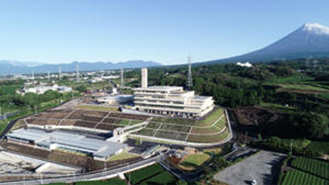
Waste treatment facility for Fuji City, Shizuoka Prefecture
(Fuji City Shin-Kankyo Clean Center, 125 tons/day x 2 units) -
2022/ Reiwa 4
Reaching total of 50 units ordered for high-efficiency waste heat recovery boiler, VEGA® Boiler
VEGA® Boiler is an advanced boiler that our company jointly-developed with our joint venture company in China. The heat transfer tube structure used enables it to be compact, have efficient waste heat recover, and achieve high power generation.
-
2022/ Reiwa 4
Delivery of waste heat recovery power generation system to Taiheiyo Cement Corporation: This is the first delivery of our new high-efficiency waste heat recovery VEGA® Boiler to a Japanese customer